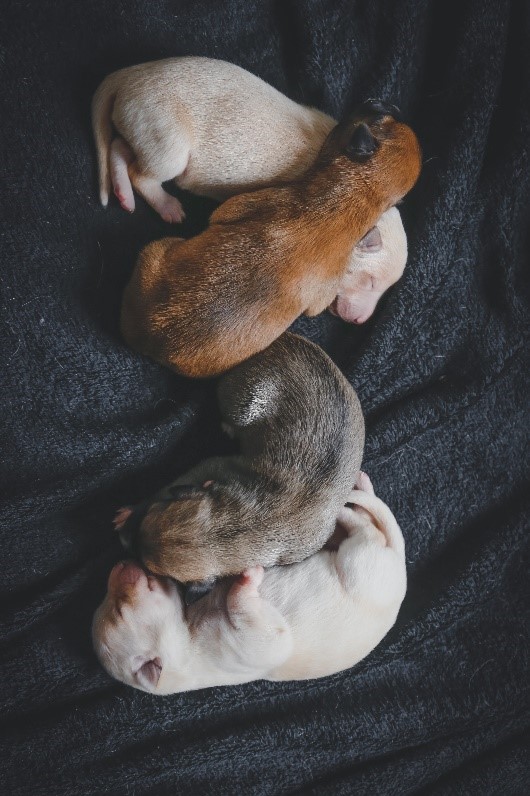Why Do Dogs Howl in Their Sleep?
Dogs have vivid dreams just like humans, and it’s not unusual to notice movement, twitching, and rolling their eyes during deep sleep or REM. When dogs howl in their sleep, this may seem shocking or concerning at first because they may sound unfamiliar.
During sleep, a dog’s howling sounds can resemble whimpering, soft cries, or a sudden, loud bark, which can be scary, causing dog owners to jump and react with immediate concern.
Like wolves howling, dogs howl for various reasons, including when they sleep. There is no cause for concern in most cases, though it’s always a good idea to get familiar with the common causes of dog howling during sleep.
Dreaming
Dogs often howl as they dream, similar to how humans may talk or move during this sleeping stage. They may experience a nightmare or a sudden scare during the dreaming stage, which can prompt a quick bark or growl.
When dogs howl during sleep, they may be communicating in their dream, similar to how wolves socialize in packs. In most cases, the howling is minimal and usually stops after a minute. If there is excessive howling, you can gently comfort your pet or wake them if they seem to be in distress.
When a dog barks excitedly but not with fear, it may be dreaming about chasing a bird or bunny through a park or a forest. They may have other visuals during their dream, which are sudden but exciting, which causes them to react. Howling is also how dogs communicate with one another, including when they perceive other dogs in a dream.
Reaction to Background Noise
Dogs living in the city, or a densely urban area, tend to get acquainted with their surroundings and are accustomed to sirens, other dogs, traffic, and people. If a dog moves to an unfamiliar area, either from a quiet town or the countryside to a busy city, they may react during their sleep when they hear a siren or new, unfamiliar sound.
An unusually loud bang of thunder, or a new person’s voice, can startle or even wake up a dog from its sleep. If they continue resting, they may react with smaller howls or whining sounds when they detect quieter but intriguing sounds around their environment, such as stairs creaking when someone moves in the house.
Stress and Anxiety
When dogs move into a new home or strange place, they may feel uneasy in this environment, impacting their sleeping patterns. Next door, a loud, barking dog may be more startling to a puppy who isn’t used to large, adult dogs.
In addition to sleeping less or having more difficulty during rest, your dog may bark or howl more frequently until they get acquainted with their new home. Until then, they may feel anxious or nervous about the unfamiliar scents and items in their environment and may perceive a threat or scary situation, even if they are safe in their new surroundings.
In some cases, dogs can suffer from moderate to severe cases of anxiety and other conditions, which can impact the quality of their sleep, including disturbances during rest and nightmares. A veterinarian can assess your dog’s health and determine which course of action works best, whether a change in routine, diet, or medical treatment.
While this may not completely stop dog howling through the night, it can significantly reduce your pet’s discomfort and give them a better chance at a good night’s sleep.
Health and Medical Conditions
While it’s not common, some dogs may react with howling or barking when prescribed a new medication or medical treatment, which can impact their sleeping patterns. Wild or stray dogs that are rescued may have trouble adjusting to a new space, even if it’s much safer and more supportive. An injured or ill animal may experience stress related to previous trauma, which can cause nightmares and similar disturbances during the night.
With proper treatment and support from a veterinarian, dogs can learn to adapt to their new home and improve their ability to sleep and relax. If changes are expected, such as a new family member, renovations, or a guest. In that case, it’s essential to keep this in mind when introducing your pet to these experiences to feel safe and comfortable.
Tips on How to Improve Your Dog’s Sleep
It’s normal to feel concerned if your dog’s sleeping patterns change, or they react during their sleep with twitching, howling, or the occasional bark. In most cases, these are common traits of dreaming, though if you find that your dog appears uncomfortable or unsafe, there are ways to help them get a good night’s rest:
- Consult with your veterinarian to determine if there is an underlying medical condition causing excessive howling or disturbances during sleep. Many vets can provide options to improve your pet’s comfort, including medication or changes to their environment to maximize a sense of security.
- You can gently wake your dog from sleeping if they appear very distressed during rest. It’s essential to do this gently, or if this isn’t possible, comfort them and speak quietly to help them ease into a calmer state of rest.
- Some dogs sleep better with their canine companions and may feel separation anxiety when they are away from other dogs or humans. In this situation, providing gentle comfort by speaking in a kind, encouraging tone can help your pup relax and resume sleeping in a more calming manner.
Final Thoughts
Many dogs howl, bark, and growl during sleep, which is how they react during dreams. While howling behavior may be more common for some dogs, it’s not harmful, as long as your pup is well supported and safe where they sleep.
While various health conditions contribute to sleep disturbances and may impact the quality of your pet’s rest, it’s most likely that your dog will adjust to most changes in life, whether it’s a new home or a slight change in their environment.

